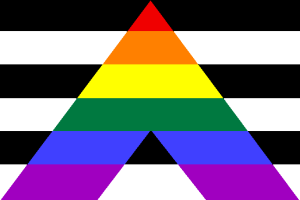The guest post was written by Sommer Foster, the Political Director for Equality Michigan and a long time political activist. You can follow her on Twitter at @SNFoster.
 I used to be a self-proclaimed ally. I had a gay best friend. I had gay and lesbian family members. I voted against the gay marriage ban. I pushed back against homophobic comments written on social media. I had an HRC Equal Sign sticker on my computer. I was progressive. I was enlightened. And I rightly believed that LGBTQ people deserve the same rights as everyone else. I was proud to claim my ally-ship as my identity. I was an LGBTQ Ally!
I used to be a self-proclaimed ally. I had a gay best friend. I had gay and lesbian family members. I voted against the gay marriage ban. I pushed back against homophobic comments written on social media. I had an HRC Equal Sign sticker on my computer. I was progressive. I was enlightened. And I rightly believed that LGBTQ people deserve the same rights as everyone else. I was proud to claim my ally-ship as my identity. I was an LGBTQ Ally!
Except, I wasn’t. I was just a decent person who believed in equal rights for everyone. That isn’t exceptional, and I certainly didn’t deserve a pat on the back or any accolades.
Through a lot of work and a lot of self-education, I learned that my ally-ship wasn’t helping the community that I claimed to be aligned with. The only person my ally-ship was helping was me. My ally-ship was about my status as an ally, not being an ally, and that is something it was never intended to be.
My first problem was I wasn’t talking to LGBTQ people about what THEY needed. Yes, I talked to my LGBTQ friends about work, politics, and random gossip. But, we weren’t talking about job discrimination, or how it felt to come out almost every single day, or the fear of walking down the street, or the intense bullying they face, or how society normalizes being cis or heterosexual and erases their identities at every turn.
So, once I started talking to folks, I realized that I needed to stop talking and do a lot more listening. I stopped calling myself an ally. I became dedicated to the principle of standing in solidarity with the LGBTQ community. I became an accomplice.
I reached out beyond my über-educated friends that lived in suburbia with super-supportive parents. If I was serious about standing in solidarity, I needed to listen to the experiences of lesbian, gay, bisexual, and transgender people. I needed to listen to people who experience homophobia, biphobia, or transphobia, and I also needed to hear how the intersection of racism, sexism, and poverty contributes to further marginalization, especially for those for whom waking up everyday, and living an authentic life, is a revolutionary act.
As an accomplice, it was important for me to say, “Yes, I support you, and I am here with you. I am rolling up my sleeves. What can I do?”
As someone that has lead campaigns and has been a leader on many issues, recognizing that it is not my place to lead this struggle was a difficult thing for me to do. But I knew that for me to be a genuine accomplice, I needed to follow the lead of people who have lived this. I needed to follow those who have spent their lives engaged in the struggle for equality, particularly those LGBTQ people who are most vulnerable because as much as I can empathize, I can never fully understand.
It is also important for me to be accountable to the LGBTQ community and to accept criticism. It can be very easy to act with the best of intentions and still do significant amounts of harm to the people I love and respect by choosing tactics or methods that reinforce my own privilege. This is why, as I engage in this work, listening is one of the most important things I can do.
If LGBTQ people are telling us over and over again that something is wrong with our current tactics, it is important that we take it seriously. These critiques should not be taken personally; they should be seen as opportunities for personal reflection and growth.
I have learned so much on this journey and I am still learning, I am still listening, and I am still educating myself.
I will never be a perfect accomplice. I will make mistakes and those mistakes will allow me to grow. Sometimes I take up too much space, or reinforce gender norms, or I may even use the wrong pronoun. But, as an accomplice, I am willing to own that and say, “I’m sorry.” I am committed to being better.
I am committed to waking up every morning and asking, “What can I do to be in solidarity with the LGBTQ community today?” I hope you will join me.



